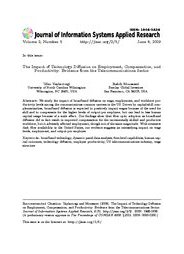Volume 2
Abstract: We study the impact of broadband diffusion on wage, employment, and workforce productivity levels among the communications common carriers in the US. Driven by capital-skill complementarities, broadband diffusion is expected to positively impact wages because of the need for skill and to compensate for the higher levels of output per employee, but can lead to less human capital usage because of a scale effect. Our findings show that fiber optic adoption as broadband diffusion did in fact result in improved compensation for the incrementally skilled and productive workforce, but it adversely affected employment, though not of the same magnitude. With extensive dark fiber availability in the United States, our evidence suggests an intensifying impact on wage levels, employment, and output per employee. Keywords: broadband technology, dynamic panel data analysis, firm-level capabilities, human capital outcomes, technology diffusion, employee productivity, US telecommunications industry, wage structure Download this issue: JISAR.2(5).Yaylacicegi.pdf (Adobe PDF, 19 pages, 830 K bytes) Preview the contents: Yaylacicegi.j.txt (ASCII txt, 57 K bytes) Recommended Citation: Yaylacicegi and Moussawi (2009). The Impact of Technology Diffusion on Employment, Compensation, and Productivity: Evidence from the Telecommunications Sector. Journal of Information Systems Applied Research, 2 (5). http://jisar.org/2/5/. ISSN: 1946-1836. (A preliminary version appears in The Proceedings of CONISAR 2008: §2332. ISSN: 0000-0000.) |
